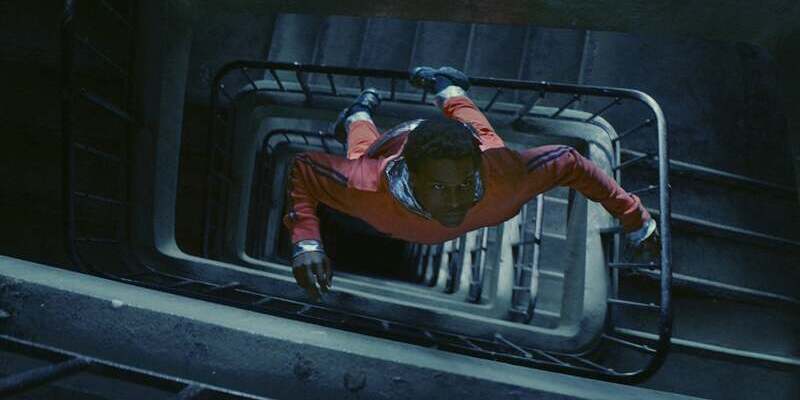
Review by
Eric Hillis
Directed by: Fanny Liatard, Jérémy Trouilh
Starring: Alseni Bathily, Lyna Khoudri, Jamil McCraven, Finnegan Oldfield

The utopian dream of the 1960s comes crashing to earth in a pile of
rubble in Gagarine, the feature debut of directors Fanny Liatard and
Jérémy Trouilh, who previously told this story in short film
form. The title refers to the film's real-life setting, a giant housing
project on the outskirts of Paris which was named in honour of the first
man to leave Earth's orbit. Gagarine opens with archive footage of the
cosmonaut visiting the project in 1963, surrounded by its new residents,
a working class mix of Parisian locals and post-war immigrants from
France's colonies. Reflected in Yuri Gagarin's smile and in the swelling
crowds that greet him is a sense of optimism, of hope for the brighter
future the space race might bring us.

But just as the craft that launched Gagarin into space would never be
allowed off the ground by today's standards, so too has Gagarine become
uninhabitable in the decades since it was built. Now riddled with
asbestos, the building has been condemned and is set to be demolished
once its residents have been rehoused.
While most of Gagarine's tenants are happy to leave the complex,
teenager Youri (Alséni Bathily; think a French John Boyega),
abandoned by his mother, is desperate to remain on site. After naively
attempting to rewire the building and fix some of its electrical
problems with fuses and cables salvaged from a local scrap yard, Youri
is forced to face the cold truth that the building is set to be reduced
to a cloud of ash. When the other residents leave, Youri remains behind,
along with a stubborn drug dealer (Finnegan Oldfield), and sets
about turning a floor of the building into a replica of the interior of
a spacecraft, complete with a Silent Running style
garden.

Liatard and Trouilh shot their film while Gagarine was in the process
of being dismantled, their own filmmaking mirroring the quest of their
young protagonist to make something of this project before its
destruction. From the filmmakers' side, the motivation appears to be to
create a historical document of a disappearing Paris, as they pepper
their film with archive footage of the area, including home movies of a
young Bathily. From Youri's side, he seems intent on saving the name of
Gagarin as much as the building itself, so obsessed is he with space
travel and the legacy of the cosmonaut who shares his name.
Like another recent French drama that blurs the lines between fantasy
and social drama, Zoe Wittock's
Jumbo, Gagarine takes its storytelling and aesthetic cues from Spielberg and
his '80s acolytes. The ending, which sees a gathered throng gaze in
wonder at lights in the sky, is straight out of
Close Encounters, while the idea of a young boy trying to save something from an adult
world that can't see its value feels inspired by ET. Youri has a very sweet and charming Amblin-esque romance with a young
Roma girl (Lyna Khoudri, the breakout star of last year's
Papicha) whose family's encampment is itself under threat as it lies in the
shadow of Gagarine.

But like so many films that draw on Spielberg, Gagarine too often does so on a superficial level. It captures Youri's
sense of wonder through its fetishised visuals, but it's a film that
feels a little too glossy and polished for its subject matter. The
eponymous housing project - which let's face it, was an architectural
monstrosity designed by city planners to keep "undesirables" (i.e
immigrants and poor people) as far from the tourist hotspots of Paris as
possible – is romanticised to a degree that suggests Liatard and Trouilh
find it more fascinating than the people that resided there. Rather than
paying tribute to the hearts and minds of a working class community,
Gagarine seems more concerned with its bricks and
mortar.


